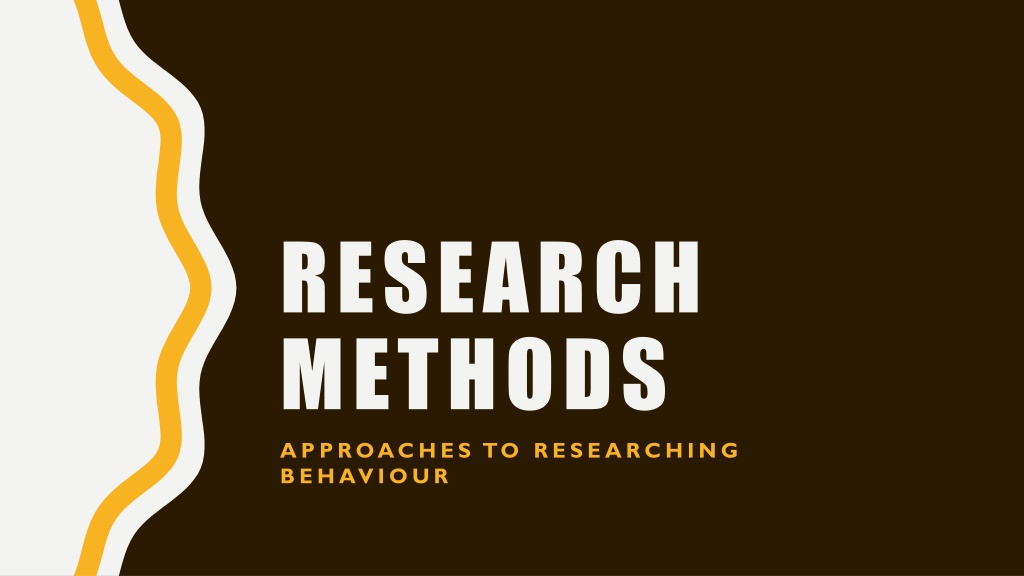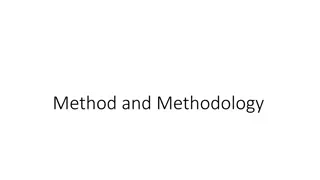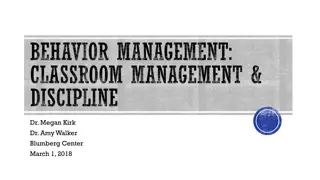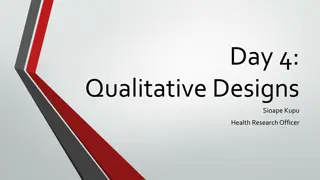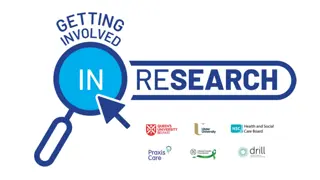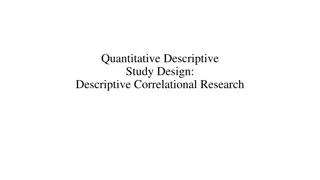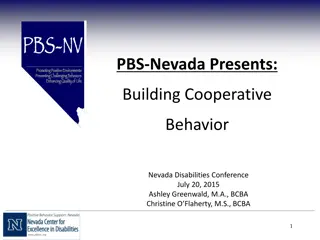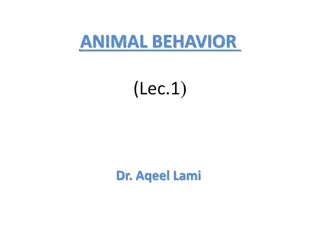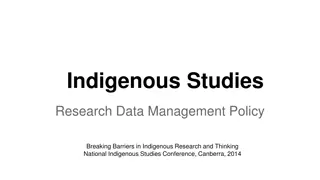Understanding Research Methods and Approaches in Behavior Studies
Explore various research methods and approaches to studying behavior, including biological, cognitive, and socio-cultural perspectives. Learn about legitimate research methods, assessment criteria, and specific examples such as bio methods focusing on brain, hormones, genes, and behavior. Dive into the specifics of conducting experiments and case studies, and discover the significance of studies like Kosfeld et al. on oxytocin and trust.
Download Presentation

Please find below an Image/Link to download the presentation.
The content on the website is provided AS IS for your information and personal use only. It may not be sold, licensed, or shared on other websites without obtaining consent from the author. Download presentation by click this link. If you encounter any issues during the download, it is possible that the publisher has removed the file from their server.
E N D
Presentation Transcript
RESEARCH METHODS APPROACHES TO RESEARCHING BEHAVIOUR
HOW WILL YOU BE ASSESSED? In paper 1, you (SL and HL) may be asked about: the contribution of research methods from any of the three approaches (bio, cog and socio- cultural) to understanding human behaviour In Paper 2, you (SL and HL) may be asked about: approaches to research Paper 3 is all about research methods and is only for HL students, we have a separate session for paper 3
LEGITIMATE METHODS Write down every single research method you can think of on your mini whiteboards; Circle the ones you think are okay to include in green and the ones you think are off limits in red; leave out any you are not sure of Experiment (Laboratory, Field, Natural, Quasi) Interview (semi-structured, structured, unstructured, focus groups) Observation (naturalistic, covert- overt, participant./non-participant, structured/controlled) Case study Correlational Questionnaires Content analysis Twin studies Adoption studies Kinship Studies Brain imaging (fMRI, MRI, PET, EEG) Animals Studies Longitudinal and Cross-sectional Cross-Cultural Studies Meta-analysis
RESEARCH METHODS There have not been ANY methods questions (SAQs or ERQs) yet at all in any approach. Methods questions can only be asked at the topic level. In pairs, complete the grid sheets for each research method (features, strengths and limitations with example studies) collaborative google docs Each pair start with a different method; rotate features, examples, strength, examples, limitations, examples Compare the two methods in terms of S and W; Venn diagrams This will give you a methods ERQ (contrast, evaluate, discuss, TWE)
BIO METHODS 12 MINS Brain and behaviour Experiments (Petersen, Draganski) and Case Studies ( Danelli, Burns and Swerdlow) Hormones, Pheromones and Behaviour Experiments (can t find any other types of research method used in pheromone research (observation, interview, case study) Newcomer (cortisol and memory), Kosfeld et al (2005) and oxytocin. Genes and Behaviour: Quasi-Experiment (Caspi et al)
LETS CHECK OUT KOSFELD ET AL Do you know this study on oxytocin and trust? If not have a quick think; how could you set up an experiment to test how oxytocin influence trust? What would the IV and DV be? What would the design be? What would the hypothesis be? What would you need to control? Card sort: match the info cards to the key features of an experiment to complete the sheet for biological; hormone and behaviour experiments. There is a completed version of the sheet but please take on board that information in the boxes needs to be topped and tailed properly into proper PETSH when using the information in an exam answer. SAQ HW: Describe how and why researchers use one research method to investigate hormones and/or pheromones and behaviour. (9)
BIO METHOD 2: CASE STUDIES For example: Burns and Swerdlow, Danelli, SM, HM SAQ HW: Outline how and why one research method is used to investigate brain and behaviour. (9)
COG METHODS 12 MINS Cognitive processes (memory models, schema theory, thinking and decision-making): Experiments, e.g. Glanzer and Cunitz, Robbins Case Studies, e.g. HM, KF Reliability of cognitive processes (reconstructive memory and cognitive biases) Experiments: Loftus and Palmer, Kahneman Cognition and Emotion (FBM) Experiments; Cahill and McGaugh
CASE STUDIES: WHAT DO YOU KNOW ABOUT THIS RESEARCH METHOD? Features Strengths Limitations Examples from cognitive processes, reliability of cognitive processes and cognition and emotion The main examples I can think of are from cognitive processes, e.g. HM, KF, LH, MV Second method for reliability of cognitive processes:
SOCIO-CULTURAL 12 MINS Individual and Group (SIT, SCT, Stereotypes) Drury Cultural Origins of Behaviour and Cognition Cultural Influences on Individual Attitudes, Identity and Behaviours (enculturation and acculturation) Focus groups Lackey et al, Bertram
INTERVIEWS: WHAT DO YOU KNOW ABOUT THIS METHOD? Features different types of interview Strengths Limitations Examples; Drury (SIT) Howarth (SIT) focus groups Lackey (Abnormal) focus groups (look at this in the Paper 3 slot as it also covers inductive content analysis) Bertram (Acculturation) Semi-structured Interviewing
LETS FOCUS ON DRURY AND BERTRAM; 2 STUDIES USING SSI Model SAQ using Bertram Check out the materials for Drury; detailed handout about the study and grid to fill in
THINK ERQS! A classic ERQ here could be something like contrast two research methods used to investigate brain and behaviour cognitive processes cultural influences on individual attitudes, identity and behaviours
ETHICAL CONSIDERATIONS RELEVANCE FOR PAPER 1, 2 AND 3 AND THE IA!
ETHICAL CONSIDERATIONS There have not been ANY ethics questions (SAQs or ERQs) yet at all in any approach The ethics question that did appear was about animal ethics as part of the bio ext not human ethics which are part of all three approaches. Like methods questions, ethics questions can only be asked at the topic level Lets decide how you might answer ethics questions for Bio, Co and Socio-Cultural
WHAT DO YOU KNOW ABOUT ETHICAL CONSIDERATIONS Let s look at a brief introduction (PowerPoint on my website)
COST/BENEFIT ANALYSIS Sometimes there might be a cost to society if research is NOT conducted in a certain area; Sometimes there are hidden costs to society due to findings being used in unexpected ways, contrary to the intention of the original researches Cost to Pps Benefits to Society
ETHICS IN RELATION TO DIFFERENT METHODS Experiments Interviews Focus groups Observations Case studies
BIO ETHICS Brain and Behaviour Hormones and Pheromones and Behaviour Genes and Behaviour Describe one ethical consideration related to one research study investigating hormones and/or pheromones and behaviour. (9)
SAQ RUBRIC QUICK CHECK You won t FAIL if you remember this! Anyway there s no such things as FAIL: First Attempt In Learning :) F Focused (engage with command term) A Accurate I Informed (substantiated with a study) L Linked back to question (explicit links between the study and how it explains the behaviour in question)
QUICK IDEA! REMEMBERING NAMES OF STUDIES
CUTLER ET AL (1998) So you stink like a cuttle fish, all new Man Code, for men couldn't be subtler?
CUTLER ET AL (1998) A quick google search led me to this: https://www.vice.com/en_uk/article /vvdkbx/i-wore-pheromones-to- become-a-sex-god Dr Winifred Cutler, owns Athena Institute who make10x; Raise the Octane of your aftershave https://www.athenainstitute.com/10 x.html
CUTLER ET AL. (1988) AND ETHICS Read the abstract of the study and make notes on ethical considerations relevant to this study What further information would you want to know about the study in order to answer the question Which ethical consideration would you choose to go with for an SAQ asking for ONE?
COG ETHICS Explain one ethical consideration with reference to one research study on cognitive processes. (9) Try answering with HM Explain one ethical consideration with reference to one research study on the reliability of cognitive processes. (9) Try answering with Kahneman et al. (1993) Explain one ethical consideration with reference to one research study on emotion and cognition. (9) Try answering with Cahill and McGaugh (e.g. deception) I have Methods SAQs on Experiment for Kahneman and Cahill and McGaugh if you don t know the studies. Complete a cost benefit analysis on each study
SOCIO-CULTURAL ETHICS Individual and Group (SIT, SCT, Stereotypes) Cultural origins of behaviour and cognition (cultural dimensions and effects on behaviour and cog) Cultural Influences on Individual Attitudes, Identity and Behaviours (enculturation and acculturation) Go through your studies table and select the best studies to use; match to deception, right to withdraw, informed consent, psychological harm
